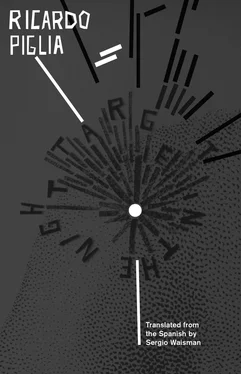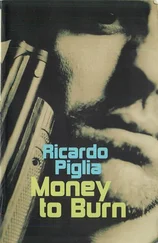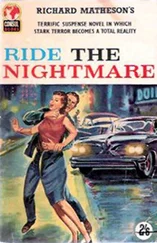Yoshio spoke Spanish slowly, using many popular expressions, for his was the world of radio. He showed them his portable Spica as if it were a gem, the small radio fit in his hand and had a patterned leather cover and a headphone that he could put in his ear so he could listen without bothering anyone. He was a Nikkei: an Argentine of Japanese origins. He was very proud, he didn’t want people to think that his fellow countrymen were only florists or dry cleaners or billiard-room barkeeps. Japanese industrial technology was gaining ground, producing small, perfect machines (Yashica cameras, Hitachi recorders, and Yamaha MiniMotos filled the cover of the magazine that the Embassy had sent him and which he showed to his guests). He always listened to X8 Radio Sarandí, the Uruguayan station that played Carlos Gardel tangos around the clock. Like all Japanese, Yoshio loved the tango; guests would sometimes hear him singing “Amores de estudiante, A student’s love,” as he walked down the empty hallways of the hotel, imitating Gardel — but pronouncing the r’s as if they were l’s in the verse flores de un día son .
They found two small balls of opium toward the back of the closet.
“I’m not innocent,” he said. “Because no one is innocent. I have my transgressions, but they are not the ones that others attribute to me.”
“No one is accusing you … yet,” Croce said, addressing him informally. Yoshio realized that the Inspector distrusted him, like everyone else. “There’s no need to get defensive ahead of time. Tell me, what did you do today?”
He had woken up at two in the afternoon, like always, he had had breakfast in his room, like always, he had done his exercises, like always, he had prayed.
“Like always,” Croce said. “Did anyone see you? Can anyone vouch for you?”
No one had seen him, everyone knew he was off from his nighttime duties in the afternoon, but no one could vouch for him. Croce asked him when he had last seen Durán.
“Not seen him today,” Yoshio answered, imitating gaucho-speak. “I haven’t seen him the whole blessed day,” he corrected himself. “I’m the night porter, I’m a porter and I live by night and I know the secrets of everyone’s life in the hotel, and everyone who knows that I know fears me. Everyone in the hotel knows that at the time Tony was killed I am always asleep.”
“And what do they fear, the ones who fear you?” Croce asked.
“Children pay for the sins of their parents. Mine is having slanted eyes and yellow skin,” Yoshio replied. “And that’s why you’re going to find me guilty, for being the most foreign of all the foreigners in this town of foreigners.”
Croce slapped him in the face with the back of his right hand, unexpectedly, hard. Yoshio’s nose started bleeding, and he closed his eyes without making a sound, affronted.
“Don’t get contrary with me, and don’t you lie to me,” Croce said. “Write down that the suspect hit himself against the corner of the open window.”
Saldías, shocked and nervous, jotted down a few lines in his notebook. Yoshio dried his blood on his small, embroidered handkerchief. He was on the verge of crying.
“It wasn’t me, Inspector. It wasn’t me, it wouldn’t ever be me,” Yoshio was standing stiff, livid. “I…I loved him.”
“It wouldn’t be the first time that someone is killed for that reason,” Croce said.
“No, Inspector. He was very good to me, he was a friend, he honored me with his trust. He was a gentleman—”
“So why was he killed?”
Croce moved about the room restlessly. His hand hurt. He had done what he had to do, he wasn’t there to feel sorry for anyone, he was there to interrogate a criminal. Sometimes he got carried away with an excess of anger that he couldn’t control, the servant-like humility of the Japanese man exasperated him. But the slap across the face had forced him to react, and now Yoshio was starting to give his real version of events.
He said that Durán was unhappy, that just yesterday he had insinuated that he intended to leave soon, but he had certain affairs to resolve first. He was waiting for something, Yoshio didn’t know what. That is all the Japanese man declared, in his own way he explained everything he knew, without actually saying anything.
“You’re going to need a lawyer, my man,” the Inspector said to him, and became pensive. “Let me see your hand.” Yoshio looked at him, surprised. “Like this,” Croce said, turning Yoshio’s palms face up. “Squeeze my arm. Harder. That’s as hard as you can squeeze?” Yoshio looked at him, confused. The Inspector released his hands; Yoshio kept them like that, in the air, like two dead flowers. “We’ll take him to the station,” Croce said. “There’ll be trouble, for sure, when we take him out of the hotel.”
And there was. The neighbors crowded around the hotel entrance, as soon as they saw Yoshio they started insulting him, calling him a “murderer,” and trying to strike him.
An old man named Unzué threw a rock that hit Yoshio on the forehead. Calesita the Madman started spinning in place and screaming obscenities. Souto’s sister rushed up, pushed against Saldías’s arms (who was trying to cover Yoshio), bent her gray face forward, and spit on the criminal’s face.
“Murderer!” the woman yelled, hatefully but with an impassive look, as if she were reciting a line, or sleeping.
Prosecutor Cueto showed up in the middle of the mess. He told everyone to settle down, assuring them that he was there to make sure justice was carried out. He was a man of about forty years, thin and tall, although from a distance he looked deformed. There was a moment of calm, and the Prosecutor went into the hotel to speak with Inspector Croce.
“What does the police have to say?” he said as he walked in. When Yoshio saw the Prosecutor come in, he turned away and stood facing the wall.
Cueto had a stealthy way of moving, at once violent and sly, and he insulted everyone as a matter of principle. He produced a stiff smile and brought his left fingers together as if he were about to ask something.
“And what does the pansy Jap have to say for himself?”
“Nothing’s settled yet. Yoshio’s been detained, we’re going to take him to the station as the leading suspect. Which doesn’t mean that he’s guilty,” Croce explained.
Cueto looked at him with a false expression of surprise, and smiled again.
“Give her a good beating first, that’ll get her talking. A simple procedural suggestion, Inspector. You know.”
“Our opinion has already been formed,” the Inspector said.
“Mine too, Croce. And I don’t understand that plural of yours, ‘our.’”
“We’ll be writing up the report and we’ll present the charges tomorrow. You can proceed with your work after that.”
“Can you tell me,” Cueto said, addressing Saldías, “why you didn’t investigate that mulatto as soon as he arrived? Who was he? Why did he come here? Now we have this whole scandal to deal with.”
“We don’t investigate people without cause,” Croce said.
“It’s true, he didn’t do anything illegal,” Saldías added timidly.
“That’s exactly what you’re supposed to find out. A guy shows up out of nowhere, he settles here, and the two of you don’t know anything? Now that’s strange.”
He’s pressuring me, Croce thought, because he knows something and he wants to see if I know what he knows, too. And he wants to shut the case quickly by declaring it a sex crime.
“Whatever happens will be your responsibility, Croce, do you understand?” Cueto said, and went outside to harangue the crowd of people on the sidewalk.
He never called him Inspector, as if he didn’t recognize the title. In fact, Cueto had been waiting for months for a chance to retire him, but he hadn’t found the way yet. Maybe now things would change. From the street they could hear shouts and angry voices.
Читать дальше












